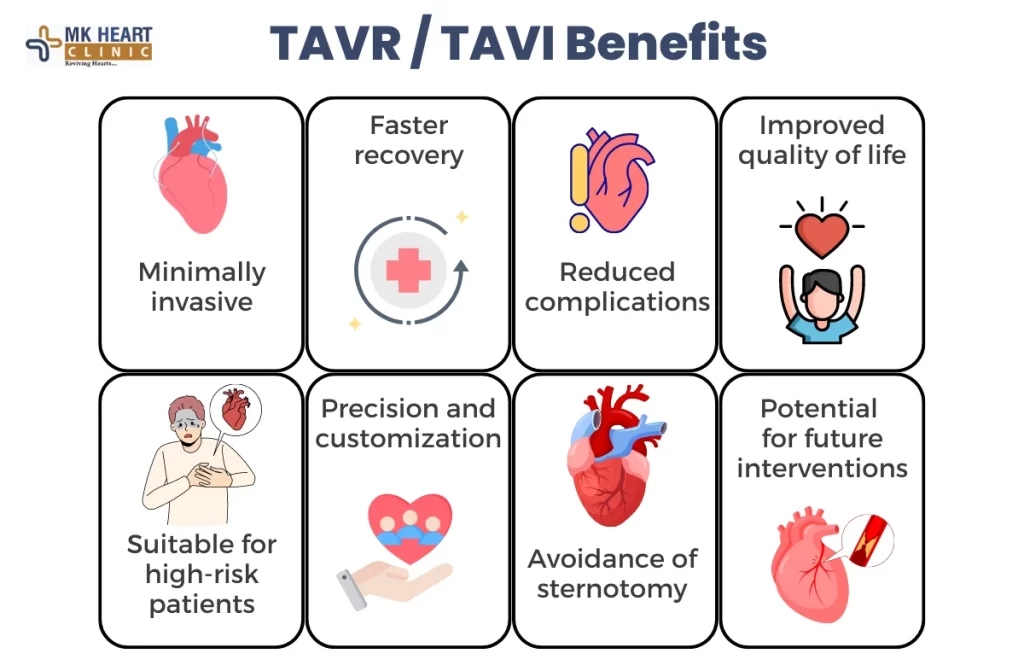Transcatheter Aortic Valve Replacement (TAVR) or Transcatheter Aortic Valve Implantation (TAVI), is a minimally invasive procedure that is used to treat severe aortic valve stenosis. Transcatheter Aortic Valve Replacement in Chennai offers an alternative to traditional open-heart surgery for patients who are considered high-risk or ineligible for surgery.
This page provides an overview of Transcatheter Aortic Valve Implantation in Chennai including the procedure, benefits, risks, and recovery.
What is Aortic Valve Stenosis?
Aortic valve stenosis refers to a medical condition where the aortic valve becomes narrowed, resulting in the obstruction of blood flow from the left ventricle of the heart to the aorta. It can lead to symptoms such as chest pain, shortness of breath, fatigue, and fainting. Severe aortic valve stenosis requires intervention to restore proper blood flow.
Transcatheter Aortic Valve Replacement in Chennai
TAVR/TAVI is a procedure that involves replacing the damaged aortic valve with an artificial valve through a catheter. Instead of a large incision and open-heart surgery, Transcatheter Aortic Valve Replacement in Chennai is performed using small incisions, which reduces the risks and recovery time associated with traditional surgery.

The TAVR/TAVI Procedure
- Pre-Procedure: Before the procedure, the patient undergoes various tests, including echocardiography, computed tomography (CT) scans, and angiography, to evaluate the condition of the aortic valve and plan the procedure.
- Anaesthesia: Transcatheter Aortic Valve Implantation in Chennai is performed under general anaesthesia or conscious sedation, depending on the patient’s condition and the preference of the medical team.
- Access: The cardiologist inserts a catheter into a blood vessel, usually in the groin, and advances it toward the heart. This catheter serves as a pathway for the delivery of the replacement valve.
- Valve Placement: Using imaging techniques, such as fluoroscopy or transesophageal echocardiography, the replacement valve is guided to the site of the damaged aortic valve. Once in position, the new valve is deployed, and it begins functioning immediately.
- Completion: The catheter is then removed, and the incision site is closed using sutures or adhesive strips.
Benefits of TAVR/TAVI
TAVR/TAVI offers several advantages over traditional open-heart surgery:
- Minimally Invasive: Transcatheter Aortic Valve Implantation in Chennai requires smaller incisions compared to open-heart surgery, resulting in reduced trauma to the body, less pain, and faster recovery.
- Shorter Hospital Stay: The recovery period for TAVR/TAVI is typically shorter, allowing patients to leave the hospital sooner and return to their daily activities more quickly.
- Reduced Risk: Transcatheter Aortic Valve Replacement in Chennai is a viable option for patients who are considered high-risk or ineligible for open-heart surgery due to underlying health conditions.
Risks and Complications
While TAVR/TAVI is generally safe, there are potential risks and complications associated with the procedure:
- Bleeding: There may be bleeding at the incision site or internally during the procedure.
- Infection: Like all invasive procedures, there is a possibility of infection.
- Valve Malposition or Migration: The replacement valve may not be properly positioned or could migrate after deployment, requiring additional intervention.
- Vascular Complications: Damage to blood vessels during catheter insertion could lead to complications such as dissection or rupture.
- Stroke: In rare cases, a stroke may occur as a result of debris dislodging during the procedure.
Recovery and Follow-Up
Following the Transcatheter Aortic Valve Replacement in Chennai procedure, patients are monitored in the hospital for a few days to ensure proper healing and to manage any complications. Once discharged, patients are advised to follow their healthcare provider’s instructions regarding medications, physical activity, and follow-up appointments.
Regular follow-up visits are important to assess the functioning of the replacement valve and monitor the patient’s overall health.
Conclusion
To conclude, Transcatheter Aortic Valve Implantation in Chennai is a minimally invasive procedure that offers an alternative treatment option for severe aortic valve stenosis. With its numerous benefits, including shorter recovery time, reduced risk, and eligibility for high-risk patients, TAVR/TAVI has become a valuable technique in the field of cardiology.
As with any medical procedure, it is essential to consult with a healthcare professional to determine the most appropriate treatment plan based on individual circumstances.
Also, Read Heart Valve Replacement Surgery.


